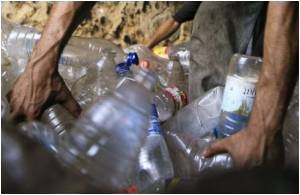
The average level of the estrogen-mimicking chemical in the Canadian population was small, only 1.16 parts per billion. This is a much higher concentration than natural estrogen levels found in the human body but BPA is also much less potent than estrogen, a Health Canada official said.
BPA is made from petroleum and, according to Statistics Canada, people are exposed primarily through food packaging.
Canada banned its use in baby bottles in October 2008 after tests showed it can affect neural development and behavior in laboratory animals exposed in the womb or very early in life.
Over 130 studies over the past decade have also linked even low levels of BPA to serious health problems, breast cancer, obesity and the early onset of puberty, among other disorders.
But its impact on humans is disputed, and it is still widely used in plastic water jugs, soft drink cans, hockey helmets, mobile phone housings, computers, car bumpers, carbonless papers and other consumer products.
Advertisement
However, it added, "Based on the overall weight of evidence, Health Canada has concluded that the current dietary exposure to BPA through food packaging is not expected to pose a health risk to the general population."
Advertisement
"I expect there will be a push now to try to find alternatives to some of these products containing BPA," Joe Schwarcz, a chemistry professor at McGill University in Montreal, told AFP.
"BPA is critical to the functioning of the world, but it's certainly possible that exposure can be curbed," he said.
"There are no alternatives for BPA in many cases currently," he explained, but efforts are underway to find alternatives to its use in food tins, for example.
As well, alternatives already exist to "cash register receipts that have appreciable amounts of BPA," he added.
Source-AFP









